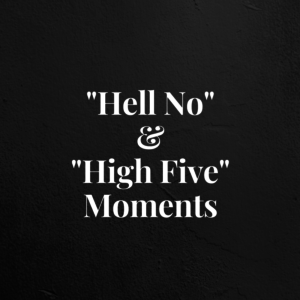 When trying to define what our individual values are, there are three things I have found helpful. First, there are those pivotal stories that make up our foundation – the stories that “define” a moment for us. These stories are ones we remember as instrumental in shaping who we are and how we think. In each of these stories is a value we decided was important and became ours. The other two ways to identify values are in what we call “Hell No” and “High Five” moments. “Hell No” moments are those in which we decided not to do something, not to allow something to happen, and simply said “Hell No.” A value was likely about to be violated if we did not say no. A “High Five” is a moment we celebrate for some accomplishment or pivotal moment that had meaning. At its core, there is a value being celebrated.
When trying to define what our individual values are, there are three things I have found helpful. First, there are those pivotal stories that make up our foundation – the stories that “define” a moment for us. These stories are ones we remember as instrumental in shaping who we are and how we think. In each of these stories is a value we decided was important and became ours. The other two ways to identify values are in what we call “Hell No” and “High Five” moments. “Hell No” moments are those in which we decided not to do something, not to allow something to happen, and simply said “Hell No.” A value was likely about to be violated if we did not say no. A “High Five” is a moment we celebrate for some accomplishment or pivotal moment that had meaning. At its core, there is a value being celebrated.
Last October, Senator John McCain demonstrated a perfect example of a “Hell No” moment during his speech at the National Constitution Center in Philadelphia. It was a brilliant speech, forcefully delivered from a man who throughout his career has shown honor and integrity in all that he has done. Honor and service were the values he stood up for in his “Hell No” moment, as he has throughout his life. Regardless of your political views, this is a man who would never dishonor his country, his fellow citizens or himself.
“We live in a land made of ideals, not blood and soil. We are the custodians of those ideals at home, and their champion abroad. We have done great good in the world. That leadership has had its costs, but we have become incomparably powerful and wealthy as we did. We have a moral obligation to continue in our just cause, and we would bring more than shame on ourselves if we don’t. We will not thrive in a world where our leadership and ideals are absent. We wouldn’t deserve to.”
Few of us will have a national stage to show such leadership in action and to stand up for our values in such a powerful way. However, we all have the ability to make an impact on a daily basis within our spheres of influence. Leaders are watched closely. Everyone is looking for proof or disproof of a leader’s stated values. The minute an equivocation happens on a stated value it becomes moot or morphs into something else. This is not lost on those who observe. As a leader, it is paramount that we own our values, that we show through our word and deed that we live them. We let “Hell No” moments show others what we will not tolerate and what we stand for. By doing so we are not only true to ourselves but showing others the power of values and demonstrating how they might stand up for theirs.
“Hell No” moments don’t need to be public, they need to be real. The lines we do not cross in private are often more powerful than those that are public. Your values are those lines.
